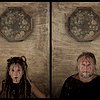Part 2
Could you take us through a day in your life, from a possible morning routine through to your work? Do you have a fixed schedule? How do music and other aspects of your life feed back into each other - do you separate them or instead try to make them blend seamlessly?
Music is our life, so there's no real separation between music and the rest. We are involved in so many different projects, that we hardly have a fixed schedule, because we don't spend much time at home. If we're at home, we usually spend the day in front of the computer, trying to recover as much backward job as possible, to spend some time with our partners, and go to other bands' shows (we think this is really important). But most of our days are like this: taking some time to release where you just woke up, get food, drive, get more food, soundcheck, get more food, get drinks, play, get more drinks, go to sleep.
Could you describe your creative process on the basis of a piece or album that's particularly dear to you, please? Where did the ideas come from, how were they transformed in your mind, what did you start with and how do you refine these beginnings into the finished work of art?
Our last 3 albums had a very similar process for all the tracks. Bruno gets a whole lot a samples (cut by him and by other musicians), goes to a studio and records a bunch of drums + samples patterns. Some of them are just short ideas, others have a proper structure. He gives them to Stefania, who chooses which ones she likes, and suggests some changes. Then we go to another studio and record a pre-prodution (the one we made for “Abisso” became the “Abisso/Genesi” limited edition cassette, if you're curious).
This is especially important cause it's when Stefania performs her parts. At this point, Bruno's patterns are fixed, but Stefania's parts are still a bit open. Finally, we go to a third studio and record the album. Only now the song is finished.
There are many descriptions of the ideal state of mind for being creative. What is it like for you? What supports this ideal state of mind and what are distractions? Are there strategies to enter into this state more easily?
We cannot really answer this question, we're always ready, we don't need to be in a specific state of mind, or even to reach it ... Smartphones are definitely too much of a distraction though. Not just for us, but for everybody, especially sound engineers. It's hard to deal with someone when your heart is breaking behind a guitar's EQ and he's chatting with his PR.
How is playing live and writing music in the studio connected? What do you achieve and draw from each experience personally? How do you see the relationship between improvisation and composition in this regard?
For a long time this has been an issue for us. We couldn't reach the same power of our live sets in the studio. To be honest, initially we didn't care too much about our recordings. Our goal was to go on tour, and we didn't have money to record properly. There was no Internet, no file sharing, no streaming, our records were pressed in 500 copies and recorded with SM 57 and 58 (we still remember the joy of finally having a D112 for our 3rd album). It was obviously a minor part of our musical life.
But then people started to be interested in what we were doing, and to complain about the poorness of our recordings. But still we didn't know what to do, because our music was made doing things the wrong way ... If you hit a bass with your sticks it will sound great live, but it will be a disaster on a recording. If your floor tom sounds as deep as a kick drum, it will shock your audience at the show, but on a recording it will influence the frequency spectrum. If you use no reverb on your voice, this will impress the audience, but it will sound very harsh on a recording. And so on. The solution was: forgetting about trying to play the same thing in studio as on stage. It took some time.
How do you see the relationship between the 'sound' aspects of music and the 'composition' aspects? How do you work with sound and timbre to meet certain production ideas and in which way can certain sounds already take on compositional qualities?
For OvO there is no difference between sound and composition. They're together. Especially for Stefania.
Our sense of hearing shares intriguing connections to other senses. From your experience, what are some of the most inspiring overlaps between different senses - and what do they tell us about the way our senses work? What happens to sound at its outermost borders?
Wow, this is a really interesting question. As we're not scientists, we tend to take the mystical and magical path very soon on this subject. And anyway there's still a lot of unexplained. Feeling physically, seeing, even tasting or smelling a sound are experiences that we tried, and I'm sure most of you did. But there's something deeper. Stefania studied a bit of the metaphysical matters of sound. It's a blast. Her guitar is tuned at 432 Hz ...
Art can be a purpose in its own right, but it can also directly feed back into everyday life, take on a social and political role and lead to more engagement. Can you describe your approach to art and being an artist?
Our art and lifestyle are definitely a political statement. Our music has nothing “nice”, no commercial appeal, it is extreme and uncompromising. We pay the price for it each and every day. But we're free, it's impossible to file under something. We toured for ages in squats and we supported political initiatives, and we still do. We decided not to have a regular job, to avoid routines (even if life on tour can be a routine sometimes), we support queer movements, anarchism, squats, anti-racist and anti-fascist groups.
It is remarkable, in a way, that we have arrived in the 21st century with the basic concept of music still intact. Do you have a vision of music, an idea of what music could be beyond its current form?
Its current form is already something we couldn't think about when we were born. Bands that were really scary in 1982 wouldn't scare a child nowadays. “Extreme” was a distorted guitar, while now we have harsh noise, or music made with imperceptible waves. Kids don't care about notes or singing performances, they hate guitars and emotions, but they do care about rapping flows, rhythm and sound. It's fascinating and we hope there will be no limit to extremes in music.






